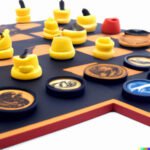The allure of classic family board games is undeniable. There’s something magical about gathering around a table with loved ones, armed with dice, cards, and game pieces, ready to engage in hours of laughter and friendly competition. These timeless games have stood the test of time, transcending generations and capturing the hearts of players young and old alike.
In this introductory section, we delve into the nostalgia that accompanies classic family board games. We explore what makes these games so enduringly charming and how they have become a beloved tradition for many families throughout the years. Whether it’s the excitement of rolling the dice or the thrill of outsmarting opponents through cunning strategies, these games offer a unique opportunity for quality bonding time and a break from the hustle and bustle of daily life.
From ancient times to modern classics, the evolution of board games is a fascinating journey. In our exploration, we touch upon their historical origins and how they have evolved into the familiar favorites we know today. These classics have become icons in their own right, capturing our imagination with their simple yet intriguing gameplay mechanics.
Join us as we dive deeper into some of the most cherished classic family board games – Monopoly, Scrabble, Clue, Life, Connect Four – each offering its own distinct style and challenges. We examine what sets these games apart as true classics: simplicity that appeals to players of all ages, strategic depth that keeps us coming back for more, and replayability that ensures endless entertainment.
So gather your family together, dust off those old boxes filled with memories, and let us embark on a journey into the world of classic family boardgames. Get ready to experience nostalgia like never before as we rediscover the joyous moments these treasured games bring into our lives.
The Evolution of Board Games
Board games have been a beloved pastime for centuries, providing entertainment and fostering social interaction among players. The evolution of board games spans from ancient times to the creation of modern classics that continue to captivate players today. This section will provide a brief historical overview of the origin of board games and explore the emergence and popularity of classic family board games.
The origin of board games can be traced back over 5,000 years ago to Ancient Egypt. Archaeological discoveries have uncovered game boards and playing pieces in Egyptian tombs, indicating that board games were not only enjoyed during life but also believed to provide amusement in the afterlife. These early board games varied in complexity and theme but typically involved dice or similar objects for gameplay.
Throughout history, board games spread across different cultures and continents, each developing their own unique variations. For example, Chess originated in ancient India around the 6th century, while Backgammon traces its roots back to Ancient Mesopotamia. These early examples demonstrate the enduring appeal and universal nature of board games as a form of entertainment.
In more recent history, classic family board games started gaining popularity in the 20th century. Games like Monopoly, Scrabble, Clue (known as Cluedo in some countries), Life, and Connect Four became household names, transcending generations and captivating players with their engaging gameplay mechanics. The evolution of classic family board games was strongly influenced by advancements in technology and popular culture, incorporating elements such as storytelling, strategy, problem-solving, and wordplay.
| Time Period | Significant Board Games |
|---|---|
| Ancient Times | Sennet (Ancient Egypt), Pachisi (Ancient India) |
| 18th-19th century | Chess, Backgammon |
| 20th century | Monopoly, Scrabble, Clue/Cluedo, Life, Connect Four |
As board games continue to evolve, they hold a special place in the hearts of families worldwide. Classic family board games offer a timeless form of entertainment that brings people together, regardless of age or background. These games have stood the test of time and continue to be enjoyed by new generations, serving as a testament to their enduring appeal and the joy they bring to gatherings around the table.
What Makes a Board Game Classic?
When it comes to classic family board games, there are certain qualities that set them apart and ensure their enduring popularity. These timeless games have stood the test of time and continue to be cherished by families around the world. In this section, we will explore the key traits that make a board game a true classic.
Simplicity: Easy to Learn, Hard to Master
One trait that sets classic family board games apart is their simplicity. These games are typically easy to learn, with straightforward rules that can be grasped quickly by players of all ages. From young children to grandparents, everyone can participate in the gameplay without feeling overwhelmed.
However, simplicity does not equal boredom. Classic board games strike the perfect balance between accessibility and depth. While the rules may be simple, these games offer strategic depth and complexity that keeps players engaged for hours on end. The ability to master different strategies or adapt one’s approach adds an element of challenge and intrigue to these beloved classics.
Strategy: Finding the Winning Path
Another defining characteristic of classic family board games is the presence of strategic gameplay. These games often require players to analyze their options, plan ahead, and make critical decisions based on their opponents’ moves.
Whether it’s formulating a winning Monopoly strategy or optimizing tile placement in Scrabble, classic board games provide players with opportunities for strategic thinking and decision-making. This aspect adds an exciting layer of competition and encourages participants to improve their skills through repeated play.
Replayability: Endless Fun for Years
A crucial factor in determining a board game’s status as a classic is its replayability. Classic family board games possess elements that make each playthrough unique and enjoyable even after multiple sessions.
Replayability is often achieved through factors such as random chance or dynamic elements within the game. For example, Clue’s intricate murder mystery ensures that no two games are the same, as players must deduce the killer, murder weapon, and location through a process of elimination.
Additionally, classic board games often have different strategies or paths to victory that can be explored with each play. This ongoing variety and discovery make these games worth revisiting time and time again, creating lasting memories and enjoyment for generations.
Monopoly
Monopoly is widely regarded as one of the ultimate classic family board games. This iconic game has been enjoyed by generations and continues to hold a special place in the hearts of families worldwide. With its rich history, engaging gameplay, and lasting appeal, Monopoly has become a staple on game nights and gathering occasions.
The origins of Monopoly can be traced back to the early 20th century. The game was first created in the United States and quickly gained popularity, eventually becoming one of the best-selling board games of all time. Its enduring appeal lies in its blend of luck and strategy, as players navigate their way through a virtual real estate market, buying properties, collecting rent, and strategically managing resources.
Having a deep understanding of Monopoly’s rules is essential for success. The game involves skillful negotiation, astute investing, and calculated risk-taking. It also challenges players to make strategic choices that will ultimately determine their success or failure. Tips and strategies for mastering Monopoly include developing trade deals with other players to obtain key properties, building houses and hotels to maximize rental income, and carefully managing finances throughout the game.
To ensure family harmony during Monopoly sessions, it’s important to approach the game with an attitude of friendly competition rather than cutthroat tactics. The beauty of Monopoly lies not only in its gameplay but also in the memories it creates. Families can bond over moments of laughter, strategize together as they plan their moves, and experience the thrill of unexpected twists and turns.
| Fact | Description |
|---|---|
| Best-Selling Version | Monopoly has been published in over 100 countries and translated into more than 37 languages. |
| Longest Game Ever | The longest game of Monopoly ever played lasted for 70 straight days. |
| World’s Most Expensive Set | A custom-made Monopoly set was created with diamonds, gold, and silver, valued at over $2 million. |
Scrabble
Scrabble, the iconic word game, has been a favorite among families for generations. With its combination of strategy, vocabulary-building, and friendly competition, Scrabble has become a staple in the classic family board games assortment. This beloved game continues to capture the hearts and minds of players young and old.
One of the key appeals of Scrabble is the brain-teasing challenge it presents. Players are tasked with forming words using letter tiles on a game board, strategically placing them to maximize points.
The game not only tests one’s ability to construct words but also requires creative problem-solving skills. As players aim to use their letters effectively and efficiently, they must navigate the limited space available on the board while strategically taking advantage of premium spaces for bonus points.
Scrabble transcends generational boundaries by providing an interactive and educational experience for all ages. For younger players, it offers a fun way to expand their vocabulary and improve spelling skills. Meanwhile, older players can relish in showcasing their lexical prowess and strategic thinking as they select high-scoring words that can potentially tilt the game in their favor.
To foster an enjoyable experience during Scrabble game nights, consider implementing these tips:
- Familiarize yourself with commonly used two-letter words: These short words can be immensely valuable when strategically incorporating them into longer words or setting up scoring opportunities.
- Plan ahead and think beyond your current move: Anticipate potential moves from other players that may affect your planned placement. Stay flexible and adapt your strategy accordingly.
- Use opportunities to block opponents’ scoring opportunities: Pay attention to high-value tiles that may present an advantage for your opponents if left unclaimed. Strategically position your own tiles to hinder their progress while maximizing your own score.
By following these strategies and embracing Scrabble’s brain-teasing challenges, families can enjoy hours of engaging fun together. Scrabble demonstrates how a classic family board game can both entertain and educate, making it a timeless addition to any game night collection.
Clue
Clue is a classic family board game that has captivated generations with its thrilling mystery and deductive reasoning gameplay. With its iconic characters and suspenseful plot, Clue transports players into a world of intrigue and suspense, making it an ideal choice for game nights with the whole family.
One of the key appeals of Clue is its immersive detective adventure theme. Players take on the roles of different characters, each suspecting one another in a murder case set in a mysterious mansion.
The goal is to strategically gather clues and eliminate suspects, weapons, and rooms from their personal notepads to deduce who committed the crime, with what weapon, and in which room. This interactive aspect of playing detectives adds an extra layer of excitement and engagement for players of all ages.
To excel at Clue, players must employ sharp deductive reasoning skills. They need to carefully observe and analyze the information revealed throughout the game to make informed deductions about the unknown elements of the case. By narrowing down possibilities through logical reasoning, players can unravel the mystery more efficiently. This strategic element helps develop critical thinking abilities while keeping players engaged throughout the gameplay.
It’s worth noting that there are various strategies one can utilize while playing Clue. For instance, paying attention to other players’ actions can provide valuable insights into their knowledge about certain cards or potential solutions.
Additionally, keeping track of which cards are shown or not shown by other players can help deduce which cards they possess secretly. By effectively utilizing these strategies while incorporating deductive reasoning skills, players have a higher chance of being the first to solve the mystery.
Overall, Clue offers an exhilarating detective adventure experience for the whole family. From its captivating storyline to its challenging deductive gameplay, this classic board game promotes critical thinking skills and encourages meaningful interaction between players. In an age where digital devices often dominate leisure time spent at home, Clue reminds us of the joy that can be found in gathering around a table, strategizing, and unraveling a mystery together.
Life
Life, the classic family board game, has been captivating players for decades with its rollercoaster of unpredictable gameplay and decision-making. In this exciting game, players experience the ups and downs of life as they navigate through various stages, making choices that shape their virtual existence. From attending college to starting a career, getting married, having children, and retiring, Life offers a unique perspective on the challenges and opportunities life presents.
One of the key features that make Life a classic family board game is its ability to teach valuable life lessons. Through gameplay, players learn about financial responsibility by budgeting their money wisely and investing in different ventures. They also discover the importance of making decisions based on personal values and priorities, as each choice impacts their progress in the game.
Life also encourages communication and bonding among family members. As players take turns spinning the wheel or choosing paths on the game board, they have opportunities to share stories from their lives or discuss hypothetical situations presented by the game. This sparks meaningful conversations and strengthens relationships as players learn more about each other’s aspirations and perspectives.
Moreover, Life introduces an element of surprise with unexpected twists that mirror real-life experiences. Players may have to face unplanned events such as car accidents or sudden windfalls like winning a lottery. These surprises add an element of excitement and unpredictability to the gameplay, keeping players engaged and eager to see how their choices unfold.
Connect Four
The Mechanics of Connect Four
One of the most beloved classic family board games is Connect Four. This game, designed for two players, is deceptively simple yet highly addictive. The objective is to be the first to connect four discs of your color in a straight line, either vertically, horizontally, or diagonally on the 6×7 grid.
Each player takes turns dropping one of their colored discs into any column they choose, causing it to fall to the lowest available space in that column. The strategy lies in anticipating your opponent’s moves while also planning your own moves strategically.
Enhancing Critical Thinking and Pattern Recognition
Connect Four may appear straightforward at first glance, but it engages players in critical thinking and pattern recognition skills. As the game progresses, players must analyze the board and consider multiple factors before making their move. They must strategize not only how to create their own line of four but also how to block their opponent from achieving the same feat. This requires analyzing patterns and potential future moves in order to make well-informed decisions.
For younger players, Connect Four offers an opportunity to develop critical thinking skills while having fun. It teaches them spatial reasoning as they learn to anticipate where their opponent might place their discs and plan accordingly. By recognizing patterns and considering different possibilities, children can enhance their problem-solving abilities.
Accessible Fun for All Ages
One of the reasons why Connect Four has remained a classic family favorite throughout the years is its accessibility. The rules are easy to understand, making it suitable for players of all ages and skill levels. Whether you’re playing against a child or competing with friends at a gathering, everyone can easily grasp the concept and enjoy playing together.
Additionally, Connect Four’s relatively quick gameplay allows for multiple rounds within a short period of time. This makes it an ideal game for gatherings or family game nights when time may be limited. Its addictive nature and quick learning curve ensure that players will want to keep playing, fostering friendly competition and creating lasting memories.
Connect Four is a timeless classic that continues to captivate players young and old. Its simplicity, strategic depth, and accessibility make it the perfect addition to any family board game assortment. Whether you’re a seasoned strategist or just starting out, Connect Four offers endless hours of simple yet addictive fun for everyone involved.
An Ode to Classic Family Board Games Assortment
Classic family board games hold a special place in the hearts of many, bringing generations together for hours of laughter, friendly competition, and memorable moments. These treasured games have a timeless quality that transcends age and technology, offering a welcome respite from the digital world.
Whether it’s the excitement of buying properties in Monopoly, the challenge of creating words in Scrabble, or the thrill of solving a murder mystery in Clue, classic family board games provide endless entertainment and enjoyment for all ages.
One of the most remarkable aspects of classic family board games is their ability to create lasting memories. Many people can recall vividly the evenings spent gathered around a table with siblings, parents, or grandparents, engrossed in an intense game. The shared experiences and friendly rivalries create bonds and foster connection among family members. From watching your little sister bankrupt herself in Monopoly to witnessing your grandfather masterfully strategize in Clue, these games become part of our collective family stories.
Moreover, classic board games offer an escape from screens and gadgets that dominate our lives today. In this digital age where devices seem to occupy every spare moment, these analog gems remind us of the joy found in basic human interaction. Board games bring us back to simpler times when conversations flowed freely and relationships were nurtured through face-to-face interactions. They encourage healthy competition while fostering important social skills like sportsmanship and collaboration.
Conclusion
In today’s fast-paced and digitally-oriented world, the allure of classic family board games remains evergreen. These timeless games have the power to bring families together, creating cherished memories and fostering genuine connections. As we conclude our exploration of the Classic Family Board Games Assortment, it is clear that these games hold a special place in our hearts and deserve to be celebrated and appreciated.
There is something magical about gathering around a table with loved ones, rolling the dice, strategizing, and engaging in friendly competition. Classic family board games provide a unique opportunity for face-to-face interaction, allowing us to escape from the virtual realm and truly engage with one another. In an era where technology often dominates our lives, these games remind us of the importance of spending quality time with family members and reconnecting on a deeper level.
The enduring relevance and ongoing popularity of classic board games demonstrate their timeless appeal. From Monopoly’s financial wheeling and dealing to Scrabble’s word challenges, these games continue to capture the imagination of both young and old alike. Whether it is through deduction in Clue or critical thinking in Connect Four, each game offers its own set of skills to be honed while providing hours of entertainment.
As we reflect on the lasting impact of classic family board games, it becomes clear that they are not just sources of amusement but also vehicles for learning important life lessons. From making strategic decisions in Life to expanding vocabulary skills in Scrabble, these games subtly impart valuable knowledge while encouraging creativity, critical thinking, problem-solving abilities, and teamwork.
In an age filled with digital distractions, let us rekindle the magic of classic family board games by bringing them back into our homes and hearts. Rediscovering the joy and laughter that accompanies game nights can strengthen family bonds like nothing else.
So dust off those old boxes from storage or explore new additions to your collection – invite your loved ones for a night filled with nostalgic charm and everlasting memories. It’s time to embrace the magic of classic family board games once again.

I love playing all kinds of games – from classics like Monopoly to modern favourites like Ticket to Ride.
I created this blog as a way to share my love of board games with others, and provide information on the latest releases and news in the industry.





